Reviews
Yama no oto
Mikio Naruse
Japan, 1954
Credits
Review by Leo Goldsmith
Posted on 28 November 2007
Source Masters of Cinema/Eureka! DVD
Categories Flowing: The Films of Mikio Naruse
Sound of the Mountain begins in the clustered confines of Tokyo’s streets and ends in an expansive urban park with what Kikuko, the film’s heroine, describes aphoristically as “an unobstructed view.” It is a familiar narrative arc: the cluttered, confounding nature of things becomes steadily clearer to the characters, and the story’s denouement entails a physical as well as psychological opening-up, an expansion of horizons, and a view of relationships and circumstances as they are. But here this trajectory is accorded a kind of ambiguity particular to Naruse. Characters and spectators alike see things more clearly perhaps, but the way ahead remains dim. We are optimistic but uncertain, and this opening up of space gives a sense not only of expansiveness, but also of chaos, an indication that life will move forward - in fact, already is moving forward - whether we like it or not.
This is perhaps Naruse’s way of telling us that this clarity - about our relations with others, about the way things are or ought to be - is useful but can never be fully liberating. There is always something on the horizon, and we are never fully extricated from the complications of love, family, and marriage. Throughout the course of the film, this is the steady realization of Shingo, the protagonist, an aging patriarch who lives with his wife and his son and daughter-in-law in the green hills of Kamakura. Shingo senses that his life is coming to a close, and yet the immediate and obvious problems of his son’s marriage (as well as the slightly more distant marital difficulties of his daughter, Fusako) constantly draw him back into the complications of living. Sensing the parent’s duty to see that his children are married well and happily, Shingo spends much of the film vainly attempting to smooth over his son and daughter-in-law’s marital problems. But his son Shuichi’s drunken philandering and Shingo’s own paternal, but faintly erotic feelings for Kikuko, his daughter-in-law, mock his attempts to bring about a resolution.
As Shingo’s primary concern throughout the film is Kikuko and her well-being, Sound of the Mountain is in many ways yet another of Naruse’s films about women. But the film’s focalization is notable in that it is, like Mizoguchi’s Utamaro and His Five Women, a film about men’s understanding of women, or rather their lack of understanding. (Also like the Mizoguchi film, it becomes very tempting to read the male protagonist’s views as aligned with those of the film’s director.) So, while Shingo sees and hears much of what goes on in the house he shares with Shuichi and Kikuko, and while the family quite openly discusses the difficulties each faces in their relationships with one another, there remains a great deal that is concealed from view.
“Other people’s marriages are impossible to fathom,” Shingo notes in defense of his refusal to intervene in Fusako’s marital troubles, but in fact much of what Shingo struggles with is hidden from him, as it were, in plain sight. We never see Shuichi’s reportedly violent drunkenness - we only hear of its effects - but Shingo largely ignores his son’s carousing and attempts to conceal it from Kikuko’s sight to spare her feelings. Kikuko is no fool, however, and fully comprehending the situation, she conceals her own suffering in order to spare the feelings of her doting father-in-law. (Yasuko, Shingo’s wife, even tells her husband this about halfway through the film, but it takes him the length of the film to fully comprehend it.) Shingo’s affection for his daughter-in-law is so strong that he’d rather protect her than act on her behalf, and their mutual attempts to blind each other to the true nature of the situation keeps Shingo from stepping in until - two pregnancies and an abortion later - it is effectively too late.
The complexity of Shingo and Kikuko’s relationship is one of the film’s richest elements, indicating a reservoir of unresolved and knotted emotion that at once hints at gentle paternalism, incest, deep sympathy, and a blind, inappropriate May-December longing. This is not to suggest that their relationship is the least bit torrid—Kikuko’s character, as played by the definitively demure Setsuko Hara, retains the often-noted aspect of a child throughout the film. But with the vague suggestions of Kikuko’s own pampered childhood and of the loves of Shingo’s youth, there is the subtle indication that each character fulfills a deep need for the other, a need that neither fully comprehends. But Naruse is careful not to be too narrow in his characterization here.
For example, although Shingo purchases an old Noh mask in the likeness of a child, and we are certainly to interpret that this mask reminds him of Kikuko’s (that is, Setsuko Hara’s) mask-like face, the mask’s uncanniness, its creepiness, is continually reinforced and commented upon. But as he learns more about Kikuko, her pain, and her strong will, it is not long before Shingo sees the insufficiency of this likeness. From the moment we first see Setsuko Hara as Kikuko, cycling toward Shingo with affectionate, child-like cries of “Father-in-law!”, we are tempted to think of her role in Late Spring, another film in which a cycling Setsuko Hara must learn to grow up and consign a paternal figure (in that case, her actual father) to his inevitable old age. Whether or not any of this represents direct influence (Yasunari Kawabata began working on the novel on which the film is based in 1949, the year of Late Spring’s release), I suspect this has more to do with Setsuko Hara herself, her star persona, and the similar reasons that Ozu and Naruse might have had for casting her. For both directors, Hara comprises a mix of associations of innocence and resilience, of dissatisfaction that can be concealed and overcome by a determination to endure. In both films, she is a character whom the protagonist is tempted to protect, but who must ultimately be left to her own devices, her own resourcefulness.
Shuichi, the philandering roué husband, played with impossible nonchalance and callousness by Ken Uehara, seems to share in this misconception of Kikuko, alternately ignoring her, scolding her like a baby sister, and whining for her care while drunk or hungover. When Shingo confronts his secretary for details of Shuichi’s extramarital affair with Kinuko, a Tokyo war-widow, the secretary hypothesizes, “Maybe he wants something more than his wife can give him.” Whenever he talks about his wife, he says she’s just like a child. “He can’t force his wife to act like a prostitute.” Naruse deftly delays the presentation of Kinuko, the much-rumored and maligned mistress, for as long as possible, and when we finally see her, peering fearfully from behind a door on the father of the man by whom she has just become pregnant, we see that she is beautiful, vulnerable, but hardly a prostitute. Shuichi has earlier likened her to a “torrent” in comparison to Kikuko’s “lake,” but here she is merely frightened by the possibilities of what awaits her, yet determined to face it. Shingo, for all his good intentions, can only offer her money along with his apologies for his inability to do more.
Early in the film, as the family openly discusses Fusako’s marital problems with her, Shingo tells his daughter, “You can’t put the blame entirely on [your husband]. Consider your own part in this.” Analogously, while Shuichi is mostly to blame for the problems he shares with Kikuko, the situation is more complex than Shingo himself sees it to be at first. A lack of communication, a lack of understanding between husband, wife, and father-in-law: all are as much to blame as the initial cause, Shuichi’s appetite for alcohol and women. Indeed, the root of all of these problems seems to be a mutual and pervasive dissatisfaction with the way things are and a seeming inability to change them for the better.
This is precisely the situation at hand in Repast, Naruse’s film of a few years earlier, which also featured Setsuko Hara and Ken Uehara as a frustrated, imperfect married couple, and on which novelist Yasunari Kawabata worked as scenario supervisor. But the result of Sound of the Mountain is far more tragic, far less hopeful for the couple in question. And yet, while Shuichi’s ability to change remains in question, while Kikuko’s desire to reconcile with him is largely counted out, and while Shingo’s hopes to make their marriage workable have proved ineffectual, there is at least the clarity of the film’s closing moments, an unobstructed view that, if it does not show precisely how to move forward, nonetheless announces that there is the possibility of doing so.
More Flowing: The Films of Mikio Naruse
-
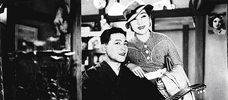
Wife! Be Like a Rose!
1935 -
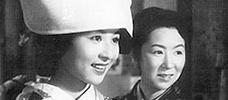
Mother
1952 -

Older Brother, Younger Sister
1953 -
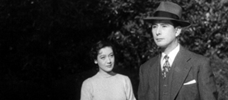
The Sound of the Mountain
1954 -

Floating Clouds
1955 -
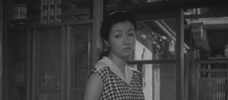
Flowing
1956 -

Summer Clouds
1958 -
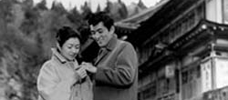
Yearning
1964 -
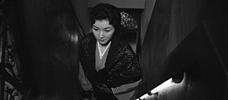
When a Woman Ascends the Stairs
1960 -
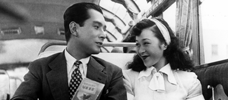
Repast
1951
We don’t do comments anymore, but you may contact us here or find us on Twitter or Facebook.



